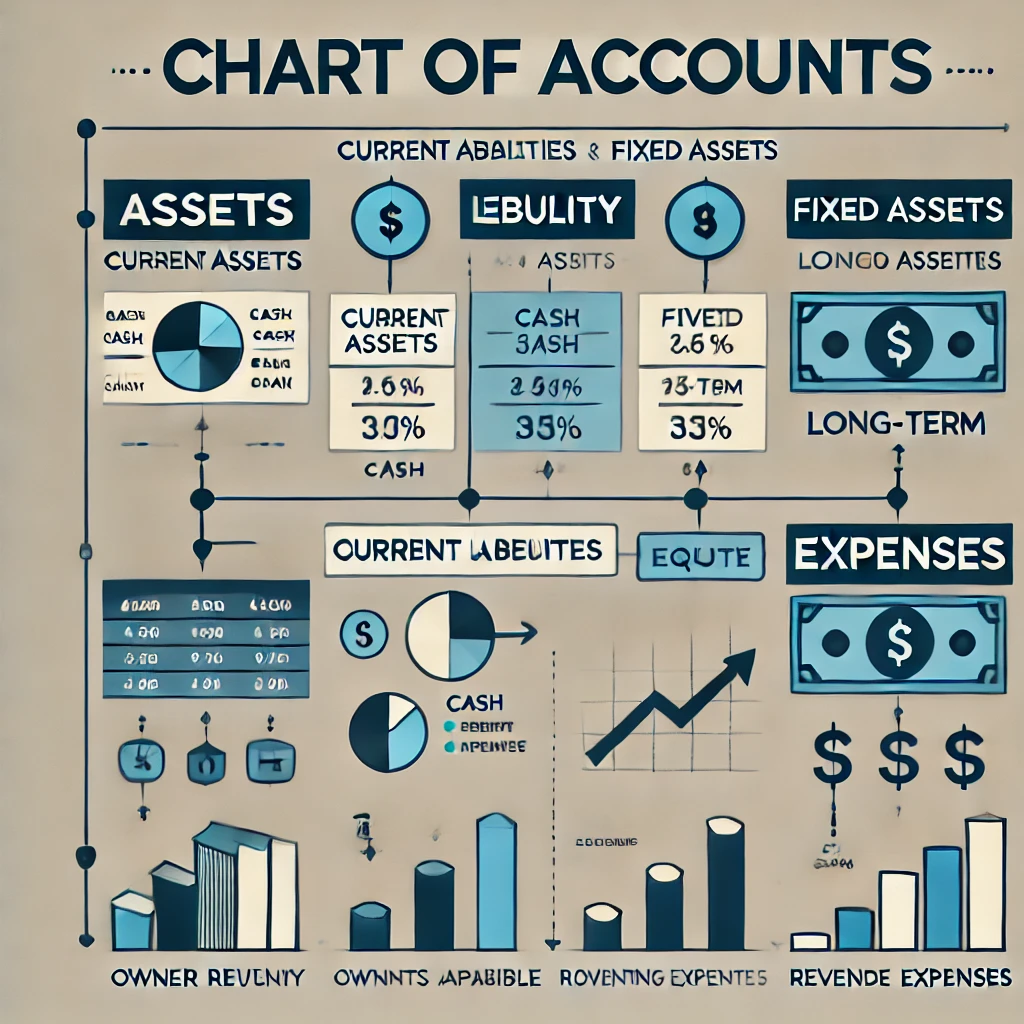Bookkeeping doesn’t have to feel like solving a puzzle. Whether you’re a coffee shop owner, a freelance designer, or a solo entrepreneur, understanding the five basic accounts in bookkeeping is like learning the ABCs of your business’s financial health. Let’s break them down with simple examples and actionable steps—no jargon, just clarity.
Table of Contents
- 1 1. Assets: The Stuff Your Business Owns
- 2 2. Liabilities: What Your Business Owes Others
- 3 3. Equity: Your Stake in the Business
- 4 4. Revenue: The Money You Earn
- 5 5. Expenses: The Costs of Running Your Business
- 6 10 Most-Asked Questions About Bookkeeping Accounts
- 7 Need Help? Let CentsIQ.com Handle the Numbers
1. Assets: The Stuff Your Business Owns

What are assets?
Assets are anything your business owns that has value—cash, equipment, inventory, or even unpaid invoices (money customers owe you).
Example:
Sarah runs a coffee shop and buys a $5,000 espresso machine. This machine is an asset because it helps her business generate income.
How to record it:
Journal Entry
- Date: January 1, 2024
- Debit (Increase): Equipment (Assets) – $5,000
- Credit (Decrease): Cash (Assets) – $5,000
Why? Sarah exchanged cash for a long-term asset (the machine). Both are assets, but one increases (equipment), and the other decreases (cash).
2. Liabilities: What Your Business Owes Others

What are liabilities?
Liabilities are debts or obligations—like loans, unpaid bills, or credit card balances.
Example:
Mike’s Bakery borrows $10,000 from a bank to buy a new oven. The loan is a liability.
How to record it:
Journal Entry
- Date: February 1, 2025
- Debit (Increase): Cash (Assets) – $10,000
- Credit (Increase): Loan Payable (Liabilities) – $10,000
Why? Mike received cash (asset increase) but now owes the bank (liability increase).
3. Equity: Your Stake in the Business

What is equity?
Equity is the owner’s claim after subtracting liabilities from assets. It includes investments you make or profits kept in the business.
Example:
Lisa, a freelance writer, invests $2,000 of her savings into her business.
How to record it:
Journal Entry
- Date: March 1, 2024
- Debit (Increase): Cash (Assets) – $2,000
- Credit (Increase): Owner’s Equity – $2,000
Why? Lisa’s personal cash becomes business equity, showing her ownership stake.
4. Revenue: The Money You Earn

What is revenue?
Revenue is income from sales, services, or other business activities.
Example:
Alex, a marketing consultant, invoices a client $1,500 for a project.
How to record it:
Journal Entry
- Date: April 1, 2024
- Debit (Increase): Accounts Receivable (Assets) – $1,500
- Credit (Increase): Consulting Revenue – $1,500
Why? Alex earned revenue but hasn’t received cash yet—it’s tracked as “Accounts Receivable.”
5. Expenses: The Costs of Running Your Business

What are expenses?
Expenses are the costs to operate your business—rent, utilities, software subscriptions, etc.
Example:
Priya, a graphic designer, pays $200 for Adobe Creative Cloud.
How to record it:
Journal Entry
- Date: May 1, 2024
- Debit (Increase): Software Expense – $200
- Credit (Decrease): Cash (Assets) – $200
Why? Priya spent cash on a business cost, so expenses increase.
10 Most-Asked Questions About Bookkeeping Accounts
- What’s the difference between assets and liabilities?
Assets add value; liabilities subtract it. - How do I track unpaid invoices?
Record them as “Accounts Receivable” (an asset). - Is a loan an asset or liability?
The cash received is an asset; the debt is a liability. - What counts as equity?
Your investments + profits – losses. - When do I record revenue?
When you earn it, even if cash isn’t received yet. - Are credit card payments liabilities?
Yes—until you pay the bill. - How do I categorize owner withdrawals?
They reduce equity (Credit Cash, Debit Owner’s Equity). - What’s the easiest way to track expenses?
Use accounting software or a spreadsheet. - Can I mix personal and business funds?
Avoid it—it muddies your financial clarity. - How often should I update my books?
Weekly or monthly to stay on top of cash flow.
Need Help? Let CentsIQ.com Handle the Numbers
Tracking these accounts can feel like juggling—especially when you’re busy running a business. If you’re in Seattle, WA, Memphis, TN, Portland, OR, or anywhere else in the U.S., CentsIQ offers friendly, affordable bookkeeping services. We’ll manage your accounts, so you can focus on what you do best.
👉 Get Started Today: Schedule a Free Consultation OR Call +1-425-465-8239
By mastering these five accounts, you’ll gain control over your business finances—one journal entry at a time. And remember, you don’t have to do it alone! 🌟







